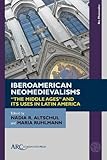Iberoamerican Neomedievalisms : “The Middle Ages” and Its Uses in Latin America / ed. by Nadia R. Altschul, Maria Ruhlmann.
Material type: TextSeries: Arc MedievalistPublisher: Leeds : ARC Humanities Press, [2023]Copyright date: 2023Description: 1 online resource (227 p.)Content type:
TextSeries: Arc MedievalistPublisher: Leeds : ARC Humanities Press, [2023]Copyright date: 2023Description: 1 online resource (227 p.)Content type: - 9781802700336
- 980.01 23
- CB353 .I24 2023
- online - DeGruyter
| Item type | Current library | Call number | URL | Status | Notes | Barcode | |
|---|---|---|---|---|---|---|---|
 eBook
eBook
|
Biblioteca "Angelicum" Pont. Univ. S.Tommaso d'Aquino Nuvola online | online - DeGruyter (Browse shelf(Opens below)) | Online access | Not for loan (Accesso limitato) | Accesso per gli utenti autorizzati / Access for authorized users | (dgr)9781802700336 |
Frontmatter -- CONTENTS -- List of Illustrations -- Chapter 1. Postcolonizing Neomedievalism: An Introduction -- Chapter 2. The Criollo Invention of the Middle Ages -- Chapter 3. A Militant and Peasant-Based Medieval History in Brazil: Fanning the Spark of Hope -- Chapter 4. Neomedievalism and the Hagiography of Valdemiro Santiago: Neopentecostal Sanctification -- Chapter 5. The “Middle Ages” in the Brazilian Presidential Elections of 2018: The Left, the Right, and the Centre -- Chapter 6. Averroes in Mid-Colonial and Inter-Imperial Cordoba -- Chapter 7. Hypermedievalizing and De-Medievalizing Dante: Leopoldo Lugones’s and Jorge Luis Borges’s Rewritings of Inferno V -- Chapter 8. Borges and Kennings -- Chapter 9. Memory, Desire, and Sexual Identity in Manuel Mujica Lainez’s El unicornio -- Chapter 10. Rewriting and Visualizing the Cid: The Reconstruction of Medieval Gender and Race in Argentinian Graphic Novels
restricted access online access with authorization star
http://purl.org/coar/access_right/c_16ec
This is the first volume fully dedicated to Iberoamerican neomedievalisms. It examines “the Middle Ages” and its uses in Iberoamerica: the Spanish and Portuguese American postcolonies. It is an especially timely topic as scholars in neomedievalism studies become increasingly conscious that the field has different trajectories outside Europe and beyond the English-speaking world. The collection provides needed alternatives to the by-now standardized understanding of neomedievalism as allied to nationalism, nostalgia, xenophobia, origin stories, elitism, and white Christian identity. It dislocates the field from its established trends and finds generative, yet unexplored examples of neomedievalism: political, religious, literary, and gendered. The volume will be of interest to established scholars of neomedievalism studies, to scholars of Latin America, and to the new and growing generation of students and colleagues interested in truly global neomedievalist studies.
Mode of access: Internet via World Wide Web.
In English.
Description based on online resource; title from PDF title page (publisher's Web site, viewed 26. Aug 2024)


